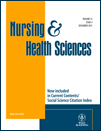Development and psychometric evaluation of the Thai Human Papillomavirus Beliefs Scale
Abstract
In this study, we developed and evaluated the psychometric properties of the Thai Human Papillomavirus Beliefs Scale. The Scale was tested on 386 young women aged 18–24 years in Chiang Mai, Thailand. Content validity of the Scale was evaluated by a panel of experts, construct validity was determined using exploratory factor analysis, and reliability was assessed for stability and internal consistency. Factor analysis provided empirical support for the existence of four factors, which accounted for 67.7% of the total variance: perceived susceptibility, perceived seriousness, perceived benefits, and perceived barriers. Cronbach's α reliability coefficients for the four subscales ranged from 0.59 to 0.86. Factors predicting intention to receive the papillomavirus vaccine were perceived susceptibility, perceived benefits, and perceived barriers. The Thai Human Papillomavirus Beliefs Scale demonstrated promising psychometric properties, indicating that it might be a useful instrument for assessing young women's human papillomavirus and cervical cancer-associated beliefs, and for predicting human papillomavirus vaccination intention.




